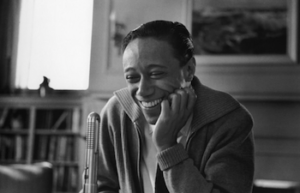
Horace Silver
*Horace Silver was born on this date in 1928. He was a Black jazz arranger and musician.
Born in Norwalk, Connecticut, Silver grew up listening to the folk music of Cape Verde, as his father was from this Afro-Portuguese nation. He also absorbed the popular jazz, blues, and gospel music. He played saxophone and piano in high school, influenced by Thelonious Monk and Bud Powell. He worked for Stan Getz in 1950. During this time, his bop compositions, "Split Kick" and "Potter's Luck," showcased his writing talents. After moving to New York in 1951, Silver played and recorded with Miles Davis, Milt Jackson, Lester Young, Coleman Hawkins, and other notable musicians.
He made his first record as a leader with Lou Donaldson in 1952 for Blue Note, which marked an affiliation with the label that lasted 28 years. Silver worked with Art Blakey's Jazz Messengers in 1953, and the group's back-to-basics approach started the hard-bop era. Silver's profile as a leader and composer rose for the next two decades, especially with his signature tunes, including "Doodlin'," "Opus De Funk," "Sister Sadie," and his 1964 Cape Verdean/Bossa Nova hit, "Song For My Father." Like Blakey's band, his group became a breeding ground for young talent, including the Brecker Brothers, Joe Henderson, Woody Shaw, and Benny Golson.
He started his own label, Silveto, in the '80s, which quickly folded; he currently records for GRP. With a player and compositional style that draws from Black gospel, bebop, Latin, and R&B sources, Horace Silver was one of the major musicians of the hard bop and soul jazz movements of the 1950s and 1960s.
In 2007, it was revealed that Silver had Alzheimer's disease. He died of natural causes in New Rochelle, New York, on June 18, 2014. His son survived him.
Jazz: A History of the New York Scene
Samuel Charters and Leonard Kunstadt
(Doubleday, Garden City, N.Y., 1962)